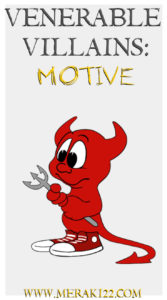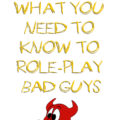Venerable Villains is a series of posts that delve into different aspects of playing a bad guy in roleplay. Villains and bad guys come in a vast range of shapes and formats, but they are rather rare, and to find them done well is even rarer still. They are also essential to any good story-line or plot for breeding conflicts and tensions. We are going to talk about all kinds of villains and how to make them work. If you want to catch up with any of the other sections of this series you can find the index here: Venerable Villains Index Page.
What is your villain’s motive? What inspires and drives them? Why are they doing what they are doing? That’s what we are looking at in today’s post, and it can be more complicated than you’d think. It is easy to assume a villain’s motive is to take over the world for personal gain. But in truth that is not how it works anywhere outside the Animaniacs. To write a really good villain you need to know what motivates him to do what he does and why.
A Villain’s Motive: Where to Start
No one is necessarily born evil. Or even misguided, those things happen with time and experience but they are not there in the beginning. Many villains never see themselves as doing anything wrong. But even those that do see their actions as wrong were not always like that.
Assuming your character was then not born evil, how did they get from infancy to being evil in later life? Therein lies the fundamental roots of your character’s motive. For what they are going to want depends on where they came from and why they want it.
A Villain’s Motive: The Beginning.
It is very easy and very common here for people to pick up the Tragic Past cookie cutter and make themselves a batch of characterization from that. These tend to be things like parental abandonment, parental abuse or the good old favorite of having killed your parents/family for said abuses. Those plots can be used and can be done well, but they are also very overdone and often done badly. If you can try and come up with something a little fresher. Or slip subtle aspects of those things into a larger image, perhaps to dilute the potential for ‘Mary-sue’.
If you have been reading the From The Ground Up series, you will know plenty about character background that I won’t go into again. But consider your scope. They do not have to have been steered toward crime/evil at a young age, they could have come to it later in life. Similarly, there is a host of things that could steer them towards it beyond the more obvious choices.
A Villain’s Motive: Examples
Beyond the childhood-home let’s explore other ways of giving a character motive to do bad things.
Personal
- Love – Shaken a few ways. Love of one person more than they care for the well-being of anyone else. Or perhaps the love of a person they cannot get or have in their current position.
- Loss – Loss and grief are things everyone processes differently. Perhaps your character maximized on the anger of it all. Deciding to take action as a subtle means of distracting himself from actually having to process his personal grief. Loss can also be of wealth or gains ergo forcing that person into a position they perhaps resent and yet play into to save face.
- Greed – Simple greed for more than you have in any aspect of life be it wealth, power or status. It can lead to doing potentially unfathomable things to achieve those ends.
- Logic – Cold logic can be a motivator for evil as well. Perhaps it is not that they hate or want anything, but they simply understand the logical tactical play of things. Without concerns such as empathy or sympathy to temper their actions like most people.
Circumstantial
- Rejection – Perhaps they were rejected, by a lover, for a job, by society at large for whatever reasons. And that inspires and motivates them to take actions against those they see as being ‘responsible’
- Desperation – This can be born of a lacking physical need, shelter, food, water, money, addiction fuel. Or for lacking emotional needs. Either way, when people get desperate to achieve something they will let little stand in their way.
- Fear – Fear can be a complex one. They can fear another force, they can fear not being powerful enough to protect themselves and their loved ones. There is also the fear of poverty and hunger. They can fear retribution or discovery. They can fear all manner of things that can lead them down a road of evil-doing.
- Bitterness – They grew up poor or disadvantaged in some other way. And as such harbor bitterness and resentment against those that they perceive to have more or easier lives.
- Protection – Potentially seeking protection for themselves due to certain circumstances. Winding up doing bad things to earn it. Or seeking to be the protector for loved ones and willing to do anything in their defense.
A Villain’s Motive: Motive To Goals
So once you know why your character was steered down the path of becoming a villain, you need to look at what they want. And this might already be obvious from how they got here. For example, if your character grew up poor and disadvantages and bitter, their goal is likely going to be centered around attaining wealth. You could even make them a Robin Hood of sorts. Have them give some of that wealth back to the people. That would make him an Anti-hero, but where you draw the line of how far he is willing to go to get the gold could change that. And potentially what he asks in return.
Just like that, a simple background trait breeds a motive. That motive leads to a goal that can evolve and expand into endless facets of potential plot creating material. And none of it necessarily involves killing characters and blowing up places in-game that you technically cannot do or enforce without permission.
A Villain’s Motive: Consider The Community
There are some things to think about when you’re working out your villain’s motive. Where it came from and where it’s leading. You are still playing on an MMORPG with other people and those other people and their characters are just as important as your own. So when you are working out what your character’s goal is with their motive in mind try and temper it accordingly, a little bit of soft and subtle OOC steering now in the character creation process will save you a ton of headaches down the line.
Try and steer their motives towards non-violent ends, or at least non-fatal ends. People don’t like their characters dying generally, and if you kill or ignore everyone you will have no one to roleplay with very quickly. So better to either take violence out of the aim or intend to have your character failing at this all the time.
A Villain’s Motive: Consider The Scope
What does your character plan to do and how will they go about doing it? Are you aiming to set up a guild or with outside a guild or work within an existing guild and how will these plans of his work alongside that? Is it the kind of RP you are interested in? Is it the kind of RP your guild is interested in? These things you should know beforehand.
Does your character need resources to achieve their goals? Gaining these can make for some excellent roleplay, and jumping in claiming to have them all already might get people’s backs up and seem overpowered. Similarly what kind of manpower does he need and how are you going to deal with that IC? These kinds of things are work a bit of thought before you roll up your character to save you getting stuck and disheartened down the line.
A Villain’s Motive: Consider The End-Game
This can go two ways. Can your character achieve their goals and do you the player want them to? Will that be an acceptable resolution as far as all others involved will agree? What will you do with the character then? If they cannot achieve their goals they will always have something to aim and work towards. If they do achieve them; then what?
If you find your character’s motive leads towards a goal that they can perhaps fill but you don’t want to fill it and ergo have completed the character arc; then what kinds of obstacles and tensions can you stir into the mix to keep it rolling?
Conclusions?
Character motive is important regardless of what kind of character you play. But if you play a villain it is twice as important. You need to always be in touch with that firm and clear base of understanding for why they are who they are, and what they are trying to achieve. This will keep them from getting carried away into being villains for the sake of villainy. It will also make them feel and appear more rounded and deep as characters.
Thoughts? Opinions? Experiences? We’d love to hear what you have to say on the topic so get in touch with us on Social Media or by Email.









